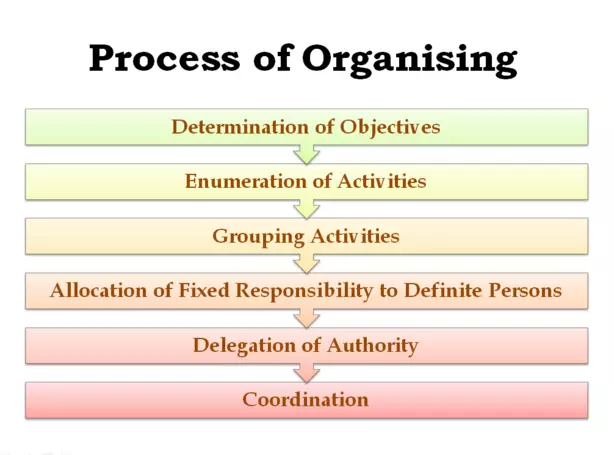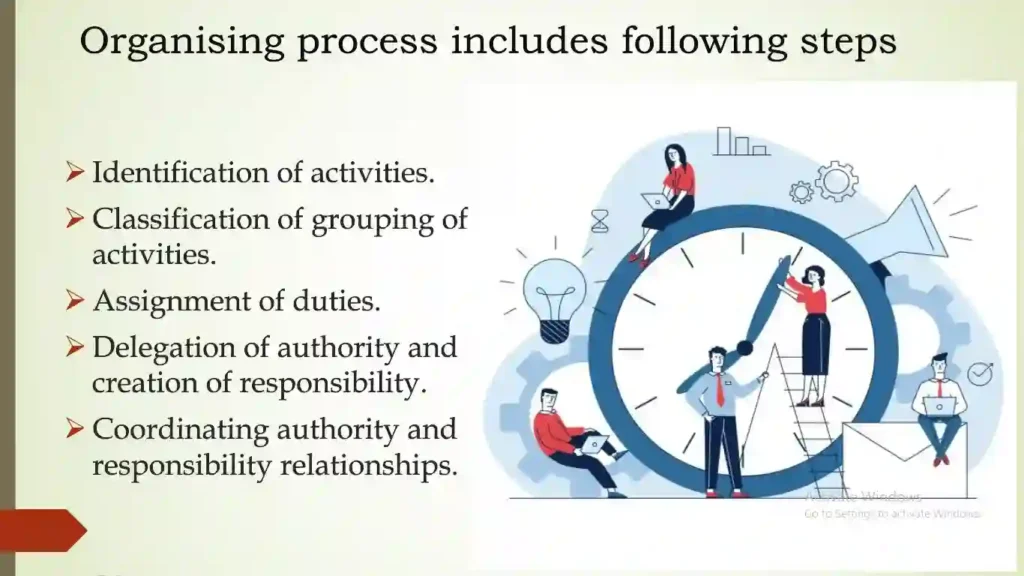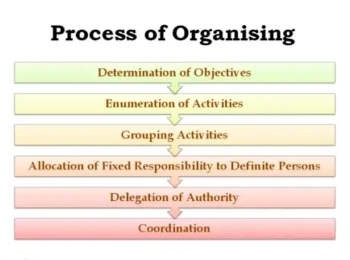Table of Contents:
-
- Process of Organising
- Principles of Organising
- Importance of Organising
Process of Organising
The process of organising may be described as the managerial function of organising. It consists of making a rational division of work into groups of activities and tying together the position representing the grouping of activities to achieve a rational, well-coordinated and orderly structure for the achievement of work.
Important steps involved in this process are:
1) Determination of Objectives
It is the first step in creating an organisation. It assists in deciding why the proposed organization is to be set up and therefore, what will be the nature of the work to be accomplished through the organisation.
2) Enumeration of Activities
Then the total job is sub-divided into important activities, e.g., the work of an industrial concern may be divided into the following main functions:
-
- Purchasing,
- Production,
- Financing,
- Personnel,
- Sales,
- Export promotion, etc.
3) Grouping Activities
Then closely related and similar activities are grouped into departments and divisions and the departmental activities are further divided into sections. Different bases are adopted to divide the activities into groups. Functions like sales, production, finance, etc., are made the basis of primary grouping. Secondary grouping is made based on geographical areas, types of customers, equipment used, processes adopted or constituent parts of major enterprise functions.
4) Allocation of Fixed Responsibility to Definite Persons
Here specific job assignments are made to different subordinates for ensuring certainty of work performance.
5) Delegation of Authority
Authority without responsibility is a destructive thing and similarly, responsibility without authority is an empty vessel. Hence, corresponding to the responsible authority is delegated to the subordinates to enable them to show work performance.
6) Coordination
This is necessary for optimum performance. It is an integrating function. The performance of departments and sections is to be integrated to achieve objectives.

Principles of Organising
The success or failure of an organisation would be revealed by its results. If it can achieve the desired objectives, it is sound and efficient – if it fails to do so, there is something wrong somewhere in the organizational structure. However, the success of a business organisation can perhaps be ensured better if the following basic principles are observed:
1) Unity of Objective
Every part of the organisation and the organisation as a whole should be geared to the basic objective determined for the enterprise.
2) Efficiency
The organisation should be able to attain the predetermined goals and objectives at the minimum cost. If it does so, it will satisfy the test of efficiency. From the point of view of an individual, a good organisation should provide maximum work satisfaction. Similarly, from the social point of view. an organisation will be efficient when it contributes the maximum towards the welfare of society.
3) Span of Management
It is widely recognised that a manager can directly supervise only a limited number of executives, It is necessary to have a proper number of executives, answerable to the top manager. Most of the authorities define a maximum of six for this.
4) Division of Work
A good organisation should consist of departments established to reflect the most efficient breakdown of enterprise activities. Proper departmentalisation is an important principle of sound organisation.
5) Functional Definition
The duties and the authority relationships in a good organisation must be properly and clearly defined so that there is no confusion or overlapping.
6) Scalar Principle (Chain of Command)
The chain of command or the line of authority must be clearly defined for building sound organisation. Every employee must know who is superior and to whom policy matters beyond his authority must be referred for decision.
7) Exception Principle
A good organisation is so arranged that only exceptionally complex problems are referred to the higher levels of management and the routine matters are dealt with by executives at lower levels. This is called the exception principle.
8) Unity of Command
In a good organisation, each subordinate should have one superior whose command he has to obey. This will avoid conflict of commands and help in setting responsibility.
9) Unity of Direction
There must be only one objective for a group of activities directed towards the same end. If each individual in a department begins to work under a different plan or programme of action, nothing but confusion will follow.
10) Responsibility
In a good organisation, the superior is responsible for the activities of his subordinates and the subordinates must be held responsible to their superiors for the performance of the tasks assigned to them.
11) Authority and Responsibility
These must be co-existing in an organisation. If it is not so, the subordinates cannot discharge their responsibility for want of the necessary power to proceed with the task assigned.
12) Balance
Some matters may be left to be disposed of by the subordinates at the lower or the lowest level while some others (say, control over capital expenditure) must be centralised and a balance between centralisation and decentralisation should thus be achieved.
13) Flexibility
The organisation must avoid complicated procedures, red-tapism and excessive complication of control so that it can adapt itself easily and economically to business and technical changes.
14) Continuity
The organisation must be so arranged as to provide for the continuity of the enterprise. For this, there must be proper provision for executive training or development.
15) Facilitation of Leadership
The organisation structure should be so devised that there is enough opportunity for the management to give an effective lead to the enterprise.
Importance of Organising
The importance of organising for an organisation is discussed as follows:
1) Increases the Efficiency of Management
There is the maximum utilisation of workers’ ability and productive capacity of the material resources under good organisation. Good organisation avoids confusion, duplication and delay of work.
2) Ensures Optimum Utilisation of Human Efforts
‘Right man at the right job’ is fundamental to the organisation. A good organisation brings harmony to the efforts of the employees and the working conditions which add to the total productivity of the enterprise.
3) Helps in the Growth of Enterprise
Good organisation contributes to the growth, diversification and expansion of all enterprises. Big and giant enterprises are the direct result of the success of the organising functions of management.
4) Places Proportionate Importance to the Various Activities of the Enterprise
The organisation classifies the entire business activities into departments. Each department receives attention according to the importance it has in the achievement of business objectives. Money and effort are spent in proportion to the contribution made by every department. It does not mean that less important department activities are neglected. It means that due importance is given to each department according to its contribution towards the achievement of the goals.
5) Facilitates Coordination
Functions and activities of the various departments are welded together to accomplish the enterprise goals. Different departments perform their functions in a closely related manner and not as competitors.
6) Provides Facilities for Testing, Training and Development of Managerial Personnel
By placing the persons in different departments, training can be imparted, as well as their abilities tested. This will be followed by their placement in the places to which they are best suited.
7) Prevents Growth of Intrigues and Corruption
The unsound organisation becomes a breeding ground of intrigues and corruption. A good pharmaceutical organisation develops morale, honesty, devotion to duty and the feeling of oneness with the enterprise.
8) Consolidates Growth and Expansion
Organising practices have encouraged business enterprises to expand their size to an ever-increasing level. With hundreds of employees and extensive ramifications of operations, giant companies are the direct outcome of the organising function of management.
9) Stimulates Creativity
Sound organisation stimulates independent, creative thinking and initiative by providing well-defined areas of work with broad latitude for the development of new and improved ways of doing things.
10) Adoption of New Technology
The effectiveness of an enterprise is measured by the reaction of staff members to the adoption of new technology. In the scientific world, there are a lot of innovations and inventions identified in the fields of marketing, production, distribution and personnel management. If the new technology is adopted by the company, the maximum benefits can be obtained in any field or activity. A flexible organisational structure is needed to adopt new technology.

